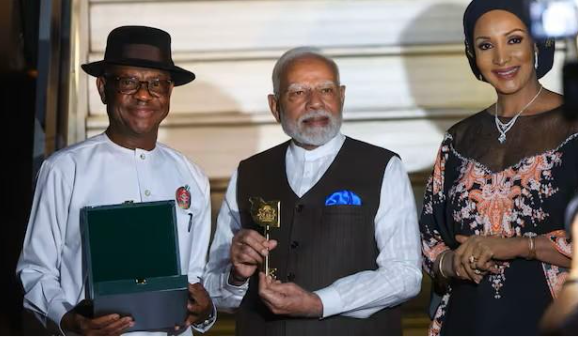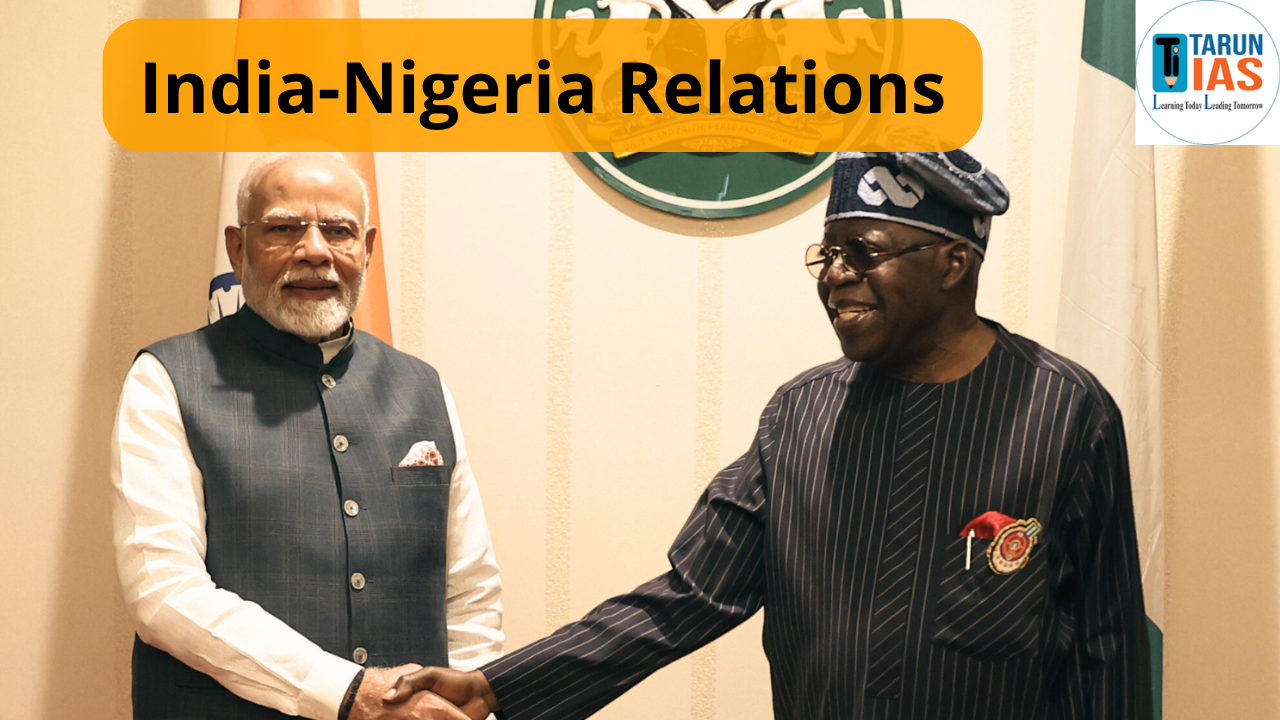India-Nigeria Relations Introduction
- India and Nigeria, two vibrant democracies with diverse cultures and growing economies, have enjoyed a robust partnership that spans over six decades.
- Prime Minister Narendra Modi’s recent visit to Nigeria, the first by an Indian Prime Minister in 17 years, has reignited focus on this important bilateral relationship.
- The visit underlined the shared commitment of both nations to collaborate across various domains, including defense, technology, health, and education. Notably, India provided 20 tons of humanitarian aid for Nigerian flood victims, and PM Modi was honored with Nigeria’s prestigious national award, the Grand Commander of the Order of the Niger.
 A Historical Perspective
A Historical Perspective
- India and Nigeria have a long-standing relationship based on mutual respect and shared values. Both countries, as leading democracies with multicultural and multilingual societies, have naturally aligned interests.
- Diplomatic Beginnings: India opened its first diplomatic mission in Nigeria in 1958, two years before Nigeria gained independence from British rule.
- Strategic Milestone: The ties were elevated to a “strategic partnership” in 2007 when Prime Minister Dr. Manmohan Singh visited Nigeria, laying the groundwork for comprehensive collaboration.
Core Areas of Cooperation
- South-South Collaboration: Both nations champion the voice of the developing world on global platforms, including the United Nations, Group of 77 (G77), and Non-Aligned Movement (NAM). This partnership amplifies the concerns of the Global South and contributes to global equity.
- Defense and Security: India has been a long-standing partner in Nigeria’s defense sector, providing training, capacity building, and equipment. For instance, the National Defense Academy in Kaduna stands as a symbol of this collaboration. India’s expertise in technology and remote sensing can support Nigeria in addressing security issues such as Boko Haram insurgency, piracy, and oil theft.
- Development Assistance: India’s Indian Technical and Economic Cooperation (ITEC) Programme has supported Nigeria’s development since 1964, focusing on skill-building and capacity development. Additionally, a $30 million Line of Credit (LOC) for a gas-fired power plant in Cross River State reflects India’s commitment to Nigeria’s infrastructure growth.
-
-
- India has also established Nigerian Defence Academy and War college while large number of Nigerians including their Presidents Babangida, Obasanjo and Buhari underwent training in India among score of others.
-
- Economic and Trade Relations: Nigeria is India’s largest trading partner in West Africa, with trade reaching $11.8 billion in 2022-23 despite a recent decline. India’s investments in Nigeria, valued at around $20 billion, span diverse sectors, including hydrocarbons, manufacturing, and services. Nigeria remains a critical supplier of crude oil, accounting for 12% of India’s oil imports.
- Energy Partnership: Energy cooperation is a cornerstone of the relationship. Beyond crude oil imports, renewable energy collaborations can help Nigeria address its power shortages while supporting sustainable development.
- Indian Diaspora: The 50,000-strong Indian diaspora in Nigeria contributes significantly to the nation’s economy, particularly in healthcare, technology, and education. Their role as cultural and business ambassadors strengthens bilateral ties.
Challenges in India-Nigeria Relations
- Declining Trade Volumes: Bilateral trade between India and Nigeria dropped from $14.95 billion in 2021-22 to $11.8 billion in 2022-23, primarily due to reduced oil imports from Nigeria. This decline reflects the changing dynamics of global energy markets and India’s diversification of oil import sources, including increased reliance on Gulf countries and Russia.
- For instance, India has significantly increased its crude oil imports from Russia following the Ukraine conflict, impacting trade volumes with Nigeria.
- Limited Strategic Investments: India’s involvement in Nigeria’s energy sector has been limited to crude oil imports, lacking significant upstream investments. In contrast, China has gained substantial production rights and developed critical energy infrastructure under its Belt and Road Initiative (BRI). For example:
-
-
- China National Offshore Oil Corporation (CNOOC) has invested over $16 billion in Nigerian oil and gas projects.
- The construction of the $11 billion Lagos-Calabar Coastal Railway by a Chinese firm illustrates the scale of Chinese investments, which overshadow India’s contributions.
-
- Sparse High-Level Engagements: Infrequent meetings of the India-Nigeria Joint Commission and limited leadership visits have hindered regular dialogue on critical issues. For example:
-
-
- The Joint Commission last met in 2016, leaving key areas like defense and economic cooperation under-addressed.
- PM Narendra Modi’s recent visit was the first by an Indian Prime Minister in 17 years, reflecting a gap in sustained high-level diplomatic engagement compared to China, whose President Xi Jinping frequently engages with African leaders.
-
- Economic Instability in Nigeria: Nigeria’s economic reforms, such as fuel subsidy removal and the devaluation of the naira, have led to inflation (currently at 32%) and foreign exchange shortages. These factors have created uncertainty for foreign investors, including Indian businesses. For instance:
-
-
- The removal of fuel subsidies led to protests and disrupted business operations in sectors reliant on affordable energy.
- Currency devaluation has adversely impacted Indian pharmaceutical and IT companies operating in Nigeria, increasing costs and reducing profitability.
-
- Lack of Economic Frameworks: The absence of a Comprehensive Economic Partnership Agreement (CEPA) limits the potential for trade diversification and industrial collaboration between the two countries. For example:
-
-
- Indian companies in Nigeria face high tariffs on finished goods, such as pharmaceuticals and machinery, which a CEPA could potentially reduce.
- Unlike Nigeria’s agreement with China under the Forum on China-Africa Cooperation (FOCAC), which includes trade facilitation measures, India and Nigeria lack similar frameworks to promote bilateral commerce.
-
- Growing Chinese Influence: China’s extensive investments in Nigeria’s infrastructure and energy sectors have bolstered its influence, challenging India’s position as a key partner. For example:
-
- The Lekki Deep Sea Port, a $1.5 billion project financed by the China Harbour Engineering Company, enhances Nigeria’s maritime capabilities and strengthens China’s economic ties.
- Huawei has been instrumental in developing Nigeria’s telecom infrastructure, a critical sector for future digital economies, reducing India’s opportunities to compete in the Nigerian IT market.
Opportunities for Enhanced Collaboration
- Strengthening Defense Cooperation: India can deepen its defense partnership with Nigeria to address security challenges like Boko Haram terrorism, piracy, and oil theft. For example:
-
-
- Training Programs: India could expand training for Nigerian defense officers, following the success of initiatives like the National Defense Academy in Kaduna, where multiple Nigerian leaders, including former military officers, have trained.
- Technology Transfers: India could provide remote sensing and surveillance technology to combat piracy in the Gulf of Guinea, a critical region for global oil trade.
- Equipment Supply: Supplying patrol vessels and advanced defense systems, such as radar technology, could bolster Nigeria’s ability to safeguard its maritime and terrestrial borders.
-
- Economic Stabilization Initiatives: India can support Nigeria’s economic stabilization through innovative financial arrangements and investments. For example:
-
-
- Barter Mechanisms: India could consider exchanging pharmaceuticals or IT services for Nigerian crude oil to address forex shortages. Such arrangements have been successfully implemented by India with countries like Iran.
- Infrastructure Investments: Indian firms like Larsen & Toubro and Tata Projects could invest in Nigeria’s infrastructure, particularly in energy, transportation, and urban development. For instance, collaborating on railway and road projects could mirror India’s investments in Ethiopia’s power grid.
- Renewable Energy Development: Partnering in renewable energy infrastructure can stabilize Nigeria’s economy while promoting sustainability.
-
- Diversifying Trade: India has significant potential to expand its export portfolio in Nigeria beyond crude oil imports. For example:
-
-
- Pharmaceuticals: India’s pharmaceutical industry can address Nigeria’s healthcare needs. Companies like Cipla and Sun Pharma could supply affordable medicines and set up local manufacturing facilities.
- Textiles and Food Products: India can increase exports of textiles and processed foods to Nigeria, leveraging existing brands like Raymond and Amul.
- Rupee-Based Trade Mechanism: Introducing a rupee trade mechanism, similar to India’s arrangement with Russia, could reduce dependence on volatile foreign currencies and promote trade growth.
-
- Expanding Development Assistance: India’s expertise in IT, healthcare, and education can help Nigeria bridge infrastructure and human resource gaps. For example:
-
-
- IT Training: Indian companies like Infosys and Wipro could collaborate with Nigerian institutions to offer IT training, creating a skilled workforce for Nigeria’s growing digital economy.
- Healthcare Development: Initiatives like telemedicine projects by Apollo Hospitals could provide affordable healthcare access to remote Nigerian communities.
- Educational Collaboration: Scholarships under the Indian Technical and Economic Cooperation (ITEC) Programme and the establishment of joint research centers can strengthen educational ties.
-
- Renewable Energy Partnerships: Collaborating on solar and wind energy projects can help address Nigeria’s chronic power shortages and contribute to global sustainability. For example:
-
-
- Solar Projects: Indian companies like Tata Power Solar could invest in large-scale solar farms in Nigeria, similar to projects they’ve undertaken in Africa.
- Wind Energy: Joint ventures in wind energy development could reduce Nigeria’s reliance on fossil fuels while providing a cleaner energy mix.
- Off-Grid Solutions: Providing solar-powered off-grid energy solutions to rural communities in Nigeria could enhance energy access and quality of life.
-
- Leveraging the Diaspora: The Indian diaspora in Nigeria can serve as a vital link in deepening bilateral relations. For example:
-
- Cultural Ambassadors: Engaging the 50,000-strong Indian community in Nigeria to promote Indian culture and strengthen people-to-people ties.
- Business Networks: Diaspora-led initiatives can facilitate trade and investment opportunities. For instance, Indian-origin businesses in Nigeria’s healthcare and IT sectors already contribute significantly to local economies.
- Diaspora Collaboration Platforms: Establishing dedicated platforms for diaspora engagement, such as annual business forums, can enhance collaboration across industries.
Way Forward
- Establishment of CEPA: A Comprehensive Economic Partnership Agreement can reduce trade barriers, encourage investments, and foster collaboration in sectors like hydrocarbons and technology.
- Currency Swap Mechanisms: A currency swap arrangement can mitigate forex challenges and stabilize trade relations.
- Infrastructure Investments: India should explore investments in Nigeria’s transport and power sectors, drawing inspiration from successful models like Ethiopia’s power infrastructure.
- Regular High-Level Engagements: Frequent leadership visits and Joint Commission meetings can ensure policy alignment and reinvigorate political ties.
- Enhanced Cultural Diplomacy: Promoting cultural exchanges and diaspora engagement can strengthen people-to-people ties, fostering goodwill and collaboration.















